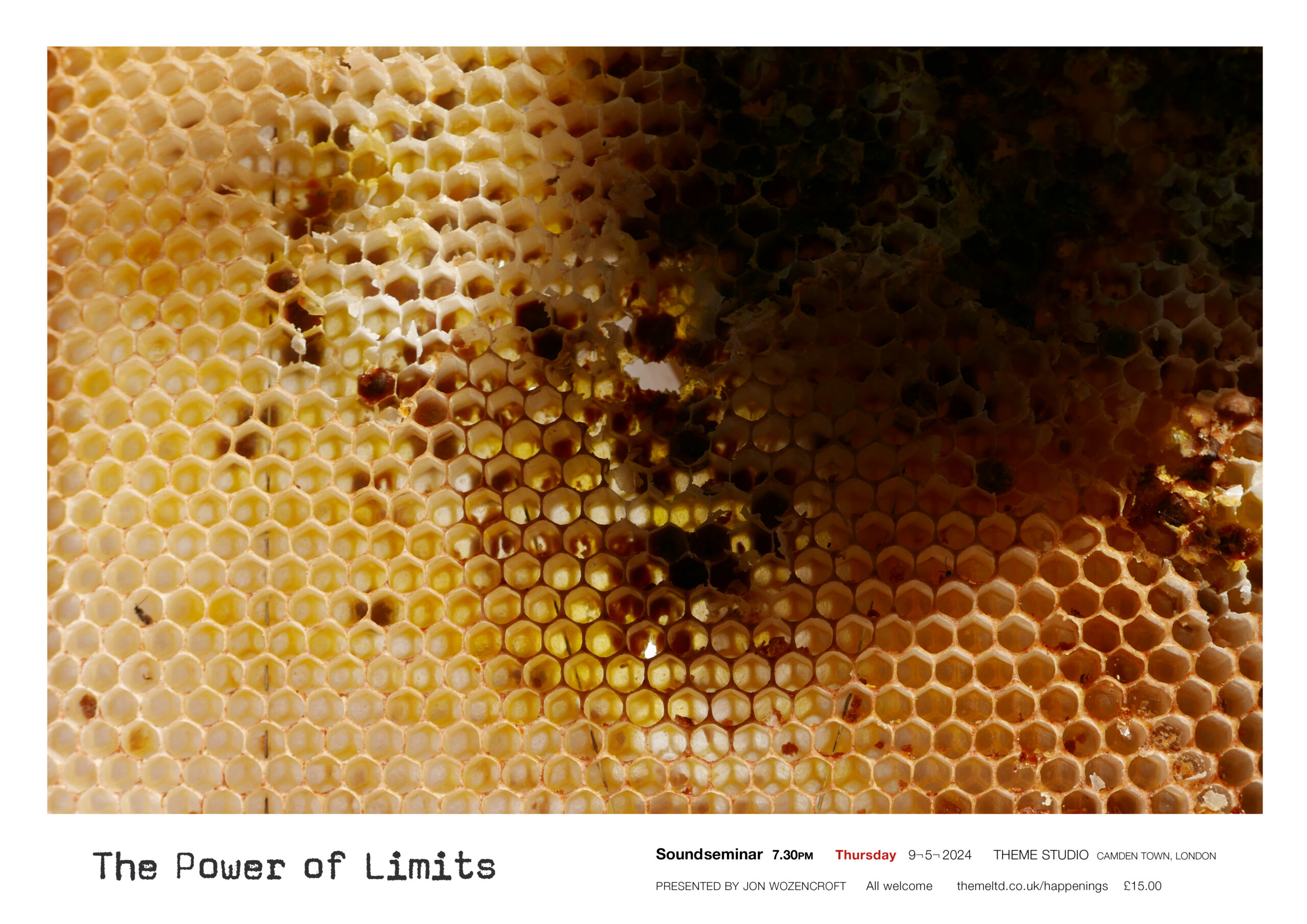The Power of Limits
Sound Seminar by Jon Wozencroft, 9 May 2024
Theme, Arlington House, 220 Arlington Road, London NW1 7HE
“Freedom of speech is freedom of music”. Sun Ra
“You can teach the craft; the poetry, you can’t teach. You can live in a virtual world if you want to, and perhaps that’s where most people are going to finish up – in a world of pictures”. David Hockney
Theme Studio is an intimate space with a great sound system, Tannoy speakers, and an upstairs area which doubles as a bar and a social space. It looks out onto a block of Victorian-era railway flats. Whilst resident in one of them in 1943, fatigued by the war, George Orwell started writing “1984” before moving to Jura and completing the work. 40 years later in 2024, “1984” seems less of a fictional warning and more like a documentary, concerning the abandonment of any limits to the relationship between war and peace, truth and lies. Psychological and linguistic abuse is the new normal.
Much less is known about György Doczi, a Hungarian architect who practiced in his home country before moving to Sweden, Iran and the United States. He settled in Seattle, and in 1981 published a major study “The Power of Limits – Proportional Harmonies in Nature, Art and Architecture” which uses sacred geometry and the measurement of the golden section to map out the relationships between the natural world and human form; presenting a holistic vision made by “a dynamic union of opposites, as demonstrated by spiral forms” which might extend to psychological and social realms. He noted that these could form a model for the need for ‘sharing’ as a way of life. Opposites, in the natural world, achieve balance and proportion; processed by technological/political dogmas, the new oppositional matrices create a maelstrom where sharing is seen as a sign of weakness.
The current climate of binary divisions between rich/poor, young/old, overheated/frozen, North/South etc., destroys harmony and creates chaos. What happened? The 60s/social vision that everything is possible lost its light and is being replaced by a dark shadow – AI promises a frictionless future, biomedicine will bring us increased longevity, and as Warhol promised, “we can stay younger longer”. Digital media and the internet drowns the everyday in material choices – what to click, what to follow, have a makeover. Clothing is crucial. On a political level our choices are compressed between ‘more of the same’ neoliberalism and aging leaders – the other options, Social Democracy, Labour, the Green Parties, fail to conjoin anything truly oppositional for fear of precipitating an economic collapse.
Last week Forbes published their latest rich list recording that there are now 2781 billionaires in the world, up 141 on the previous year, sharing a combined fortune of $14.2 trillion – (bravo that Taylor Swift is now amongst them?) – a sum greater than the GDP of any country in the world except the U.S.A. and China. The world’s richest man, Bernard Arnault, purveyor of luxury goods, was worth a mere $86 billion in 2020 – by 2024, his nest egg had risen to $223 billion. Fashion accessories are today just as profitable as computers.
“Eins zwei drei vier fünf sechs sieben acht. One two”. Kraftwerk, ‘Numbers’
In his book Doczi didn’t refer to the relationship between honey bees and humans. If they die out, we die out. There’s a fantastic sculpture talking about this at Kew Gardens, “The Hive” by Wolfgang Buttress and his collaborators.
David Hockney/Martin Gayford, ‘Spring Cannot be Cancelled’, Thames & Hudson 2021
György Doczi, ‘The Power of Limits’, Shambhala Publications 1981
Kraftwerk, Computer World, EMI Records 1981
‘The Hive’ – kew.org
Tickets can be purchased here











